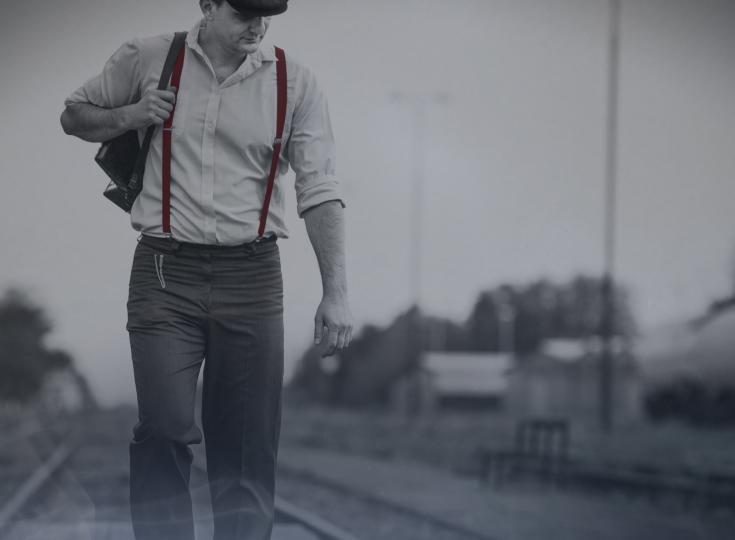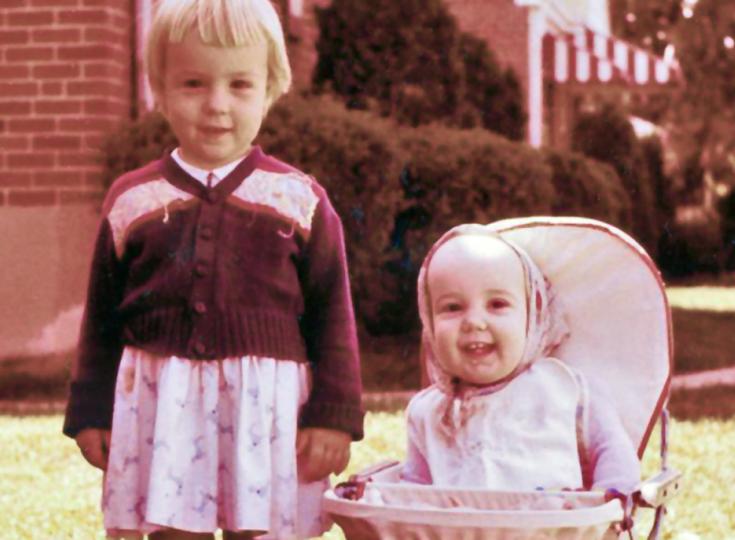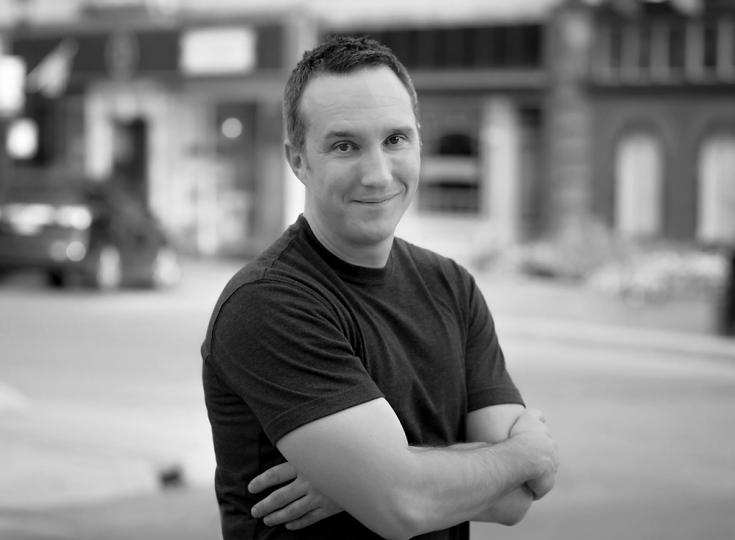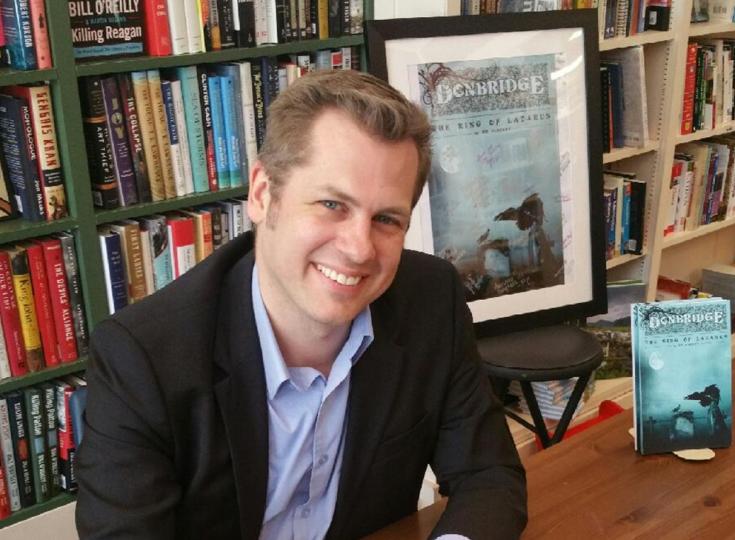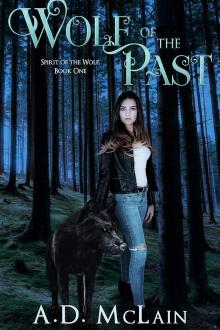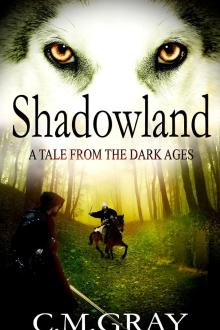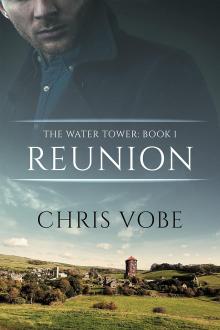Minerva Hart - Mythology, Spirituality, and Humor With a Dash of Fairy Tale-like Fantasy
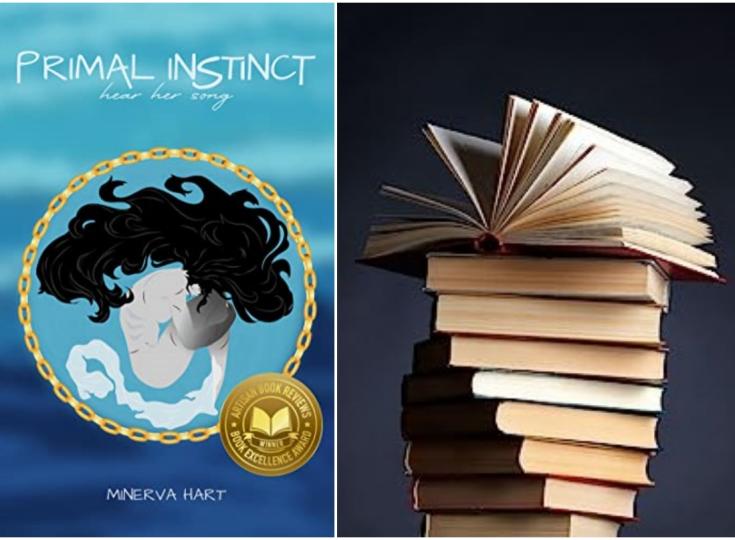
Minerva Hart graduated from John Cabot University in Rome, Italy, in 2019 with a Bachelor's Degree in Literature. She is married, loves to read, and has a weakness for chocolate cake. 'Primal Instinct' is her debut novel. 'The Deadlands' was her second. More are on the way. As our Author of the Day, she tells us all about her book, Primal Instinct.
Please give us a short introduction to what Primal Instinct is about.
Primal Instinct takes place at the end of the twenty-first century, where the man-made climate crisis has come and gone and the mega corporations have claimed what little remains. Their word is law, and their greed is bottomless. Everyone else is but a modern-day serf, forced to work tirelessly in exchange for food and housing. One such serf is Freddie Molloy, a cynical and hot-tempered young man who hates the world he finds himself in. While a geneticist by profession, right alongside his jittery but loving father, Freddie himself was a test subject a decade prior. While the experiment was deemed a failure, it did alter his DNA permanently. Even ten years after the event, he is forced to take a saltwater bath once a month. When he does this, his skin turns to scale in an excruciating metamorphosis. What he doesn't know is that this bizarre alteration will give him leeway when the genetics department gets a fascinating new specimen: A real-live mermaid, sharp of tooth and ravenous of appetite. The financier of their current project, the arrogant and domineering Mr. York, hopes to use the mermaid as a trump card in his mayoral candidacy. Since the mermaid sees Freddie as kin, he is assigned as her handler, tasked with making her malleable to experimentation. But as a bond forms between him and the mermaid, whom he names Perdita, Freddie decides to finally make a stand against the unjust world.
What inspired you to write this story? Was there anything in particular that made you want to tackle this?
As for the fantastical elements, I've always been a lover of fairy tales, folklore, and legends, and myths. My mother taught me all about Egyptian, Norse, and Greek mythology from the time I was old enough to be taught anything. For me, those stories can have so much to say and so much wisdom to pass on, if one were to look closely. In this case, I used the symbol of the mermaid to represent, in a sense, nature. A wild, untamed force that is suffering from humanity's greed yet refuses to go down without a fight. Many authors use supernatural elements as a metaphor for something very real and tangible. For example, a ghost can represent grief, a vampire can represent a toxic relationship, and a werewolf can represent the fear of puberty or a chronic illness. Of course, it all depends on how the author goes about it. When done well, it's extraordinary. I just hope I've done a good job here, too.
As for the setting and environmental themes, well, all I had to do was look around. I have always loved nature, from the time I was a child, and was taught to treat it with respect. Don't pick flowers - you'll kill them. Don't hurt animals - they think and feel just as much as you. Don't hack off tree branches - they can't scream, but they feel pain. From the time I learned about global warming, I grew afraid for myself and worried about the natural world I'd been taught to be kind to. At first, I naively thought that those in power simply didn't know what was happening, and that once they did they'd put things to right. But as I grew older, and the signs grew more severe, I finally realized the truth: That those in power have known since the eighties, but ignorance, greed, and denial have keep them from doing anything significant. It doesn't help that mega corporations want to maintain the status quo because said status quo keeps them filthy rich. Yes, we have those making a stand - just look at Rainforest Alliance, Greenpeace, WWF, Greta Thunberg, and so many other wonderful people - but we also have those who actively put their bank accounts before their children's future. That bone-deep disappointment and anger grew until I simply couldn't keep it in anymore. I expelled it all in Primal Instinct. It is a warning: Don't harm the biosphere you live in, either through inaction or greed. Whoever wins, you lose.
Why did you pick 2099 as the backdrop for your story?
I thought the year would be distant enough to add an air of fascination, the same way stories taking place in the distant past can be curious. Many elements may seem familiar, and the people inhabiting these different time periods aren't that different from folks we might know in our daily lives. And yet, they live differently than we do. Fashion, laws, ways of life, the economy, relations between classes and races, general attitudes... In some ways, we have changed; in others, we've stayed the same. It can be this blend of familiar and foreign that entices readers to stick around. In addition, I chose the end of the century to ask the question: What next? What sort of world will this be? This final year of the century we are currently living in is supposed to be the edge over which we look and see mist. We don't know what will happen next, but that doesn't mean we're powerless against it. It's our future, and our choice.
Tell us more about Freddie Molloy. What makes him tick?
Freddie Molloy is very much the embodiment of the resentment I felt when I realized the real reason why so little is actually being done about the climate crisis. He is an angry, cynical young man who is forced to live in a world his forefathers didn't ensure would be a good one for him. Having grown up reading fairy tales, he has lost all of his childhood innocence and optimism. The fact that his mother killed herself rather than live in this ruined world only aided his bottomless sense of nihilism. So did his being experimented on as a teenager, leaving him with a genetic quirk that ostracizes him from his peers. But, as we learn, there is a kernel of that childlike hope still in Freddie. When he meets a mermaid, he is initially shocked and horrified that she is nothing like the ones he read about in his youth: She has claws, fangs, and an appetite for human flesh since there are literally no fish left in the sea. At first, she seems like the confirmation that the world he believed in as a child is a lie, that even a fairy tale character is actually a monster. But over time, he gets to know this mermaid, and even names her 'Perdita'. She is vicious, yes, but only because her species has been starving for decades. Perdita is the way she is because she has little choice. But over time, we see another side to her. She is innocent, sweet, and sees him as family because of the very genetic condition he loathes. She accepts Freddie as he is, trusts him, and believes in him like no one but his father ever has. Through her, Freddie reconnects with his own humanity. And it is because of her that he finally decides to stop resenting the world around him and start challenging it. The price he pays is high, but he does so gladly.
You graduated in Rome, Italy. How has this influenced your writing?
Rome, Italy is actually my birthplace. My family is Italian, though my mother's marriage to an American following my parents' separation led to me spending my primary years in the United States. Beyond that, I've traveled quite a bit. I've been to most of Europe, Jamaica, England (back when it was still part of the UN), Israel, Egypt, and Palestine. Just for clarity's sake, I moved back to Italy in the summer of 2013, and while I may move back to the States one day with my American husband, this is our home for the foreseeable future. I like to think that traveling has helped me see the bigger picture. Those who live and die in the same country they were born in, I feel, wind up with minds as limited as their travel history. They don't realize how big the world really is, how varied, and how rife it is with things they can't even imagine. Traveling helps remedy that, and shows you how much more exists beyond what you know. If that comes across in my writing, well, I'm that much happier.
Besides writing, what other secret skills do you have?
While I don't consider it a skill, necessarily, I am a voracious reader. I read an average of 35 books a year, sometimes more, and my favorite authors include Neil Gaiman, Stephen King, Joanne Harris, Natalie Haynes, and Jessie Burton. I'm also good at sewing, I'm a passable cook, I can ride on horseback, I'm good at swimming, I'm bilingual, and I can basically plan an international trip in my sleep.
Interesting cover. Please tell us more about it.
A cover is supposed to draw the reader in, like one of those free samples you find in cheese and meat shops. One little taste and the customer becomes eager for more. My favorite sort of cover is the one that, while simple enough in design, has several subtle clues visible only to those who know the story. For instance, Stephen King's Dolores Claiborne has a very interesting design for its cover (one of them, at any rate). Fashioned entirely from red, white, and black, it gives us a sense of unease and urgency. It depicts an eclipse and a well set deep in the ground - more a pit than anything you'd draw water from. It's simple, but eye-catching. And when you know the story, you know you're looking at the central event of the story. The instance that set everything in motion, and the moment that haunts both the titular character and her daughter even though the former doesn't regret her actions and the latter doesn't learn the full story until later. I wanted my cover to follow a similar theme. It shows Perdita as she is in the book - gray-skinned, scrawny, and scarred, with long flowing hair and an eel-like tail - in a fetal position, encircled in gold chains. The fetal position is meant to depict two things: That she feel unsafe, and thus curls up in a veritable ball, and that she will bring about the 'birth' of action and rebellion. Without her, Freddie never would've been motivated to rebel against the world he hates. Without her, Freddie's father Martin never would've found the courage to go against his masters. And without her, the mer-race never would've realized the extent of their situation and struck back. The gold chains, besides being a nice contract to the blues in the background, symbolize her imprisonment on the whim of the rich. She is held on land, against her will, because Mr. York wants to use her as a tool in his candidacy. Not because he actually wants to make the city a better place, but because he and two of his buddies have turned the election into a veritable golf game. They all want to win, but they all laugh, joke, and pat each other on the back while trying to win. It's a game to them, a sport. And because of the games of the rich, this wild creature is being kept from her home.
DNA manipulation is also a central theme in this story. Why did you find this interesting to explore?
Science fiction has dappled in DNA manipulations and mutations many times - Jurassic Park, Dune, and Never Let Me Go just to name a few - for many reasons. For some authors, it's to ask, "What if?" What if we could do this or that? Considering humanity's ceaseless curiosity, it's easy to believe we'd one day reach that point in science. We want to know how things work, and whether or not we can make them work in our favor. Other authors use genetic engineering in stories to criticize us for wanting to play God and meddle with things best left alone. Just look at Frankenstein, Brave New World, or (once again) Jurassic Park. I wanted to do something a bit like the latter case while also criticizing how we treat the natural world. We're supposed to live within in. Instead, we live outside it, and believe ourselves above it. We've convinced ourselves that we are special, and it is our right to use the world and its resources for our own gain. In this case, I mean to use the story as an allegory for how many treat animals. Namely, we slaughter, hunt, and experiment on animals because many still believe that they don't have emotions or thoughts; or perhaps they feel that the life of, say, a rabbit or dog is less important than that of a human being. In the story, mermaids are seen not as living beings but as tools for humanity to use - either in science experiments, or as exotic pets for the rich. Perdita is used to create an elixir that will turn people into aquatic hybrids capable of breathing underwater, even though this causes her immense amounts of pain and accelerates her body's degradation. And the plan was never to stop with her. No, Mr. York fully intended to capture more mermaids - enough to make sufficient elixir for the entire city.
What was your greatest challenge when writing this story?
My greatest challenge was coming up with a grim, tangible world without relying too heavily on exposition. That can be very hard in science fiction and fantasy, where the setting is unique to the story and writer. Sometimes, the writer is tempted to make it feel more like homework than entertainment, but it is possible to create a rich, complex world layered with history and lore without sacrificing the pacing, characters, or story. Just look at Philip Pullman's His Dark Materials trilogy, or George R.R. Martin's A Song of Ice and Fire.
Have you always wanted to be an author? Please tell us more about your journey.
I've always loved stories, from the time I was a child. I went through books like fire, I watched any movie or TV show that had a good story and/or characters (from a child's standpoint, anyway), and I adored mythologies from around the world because of how unique they were. That hunger for stories never went away, even now that my twenty-eighth birthday is right around the corner and I've started finding silver hairs on my head. By the time I was seven, I started coming up with all manner of stories, and I had no filter between my brain and my mouth. Any story I came up with, I told it to anyone standing close-by: My mother, my father, my stepfather, the waitress at our local diner, some random guy waiting for the same bus as I, the lunch lady, the list goes on. Eventually, I started drawing out my stories like comic books, or storyboards. But my hand would get sore, and I'd have to keep buying paper. Not to mention, I eventually ran out of space for them. So, my mother suggested I started writing them on a computer. And that is what I did. In a sense, I haven't stopped since. I won first place in my middle school's yearly writing competitions two years in a row. I would've won the third year, but a new and very brainy student won on my third and final year.
High school is when I started getting serious, though. Many of the methods I developed then are still in my arsenal now. I'd write out my stories - which at that point had become novels - over the course of weeks or even months. I'd plan, I'd pick, I'd erase, I'd rewrite, and I'd refine. I began to consider not just the stories themselves, but what I wanted to say with them. Stories without themes, to me, are like scrambled eggs without salt. They're good, but they can be better. In that time, I also began to study the movies and books I was consuming, learning from them as best I could. "These two characters fall in love, and I get to witness it. I should do something like this if I ever write a love story." "This villain doesn't just do what they do for evil's sake; they have a motive that, at least to them, makes perfect sense. Do that." And so on and so forth. I've also added video-games to my studies, as it were, even though I'm the worst gamer I know. My favorite games of all time are Horizon: Zero Dawn, the first three Silent Hill games, Death Stranding, The Last of Us Parts 1 and 2, Shadow of the Colossus, What Remains of Edith Finch, Uncharted 4: A Thief's End, and Bioshock. All of them, to me, have something to offer in regards to plot, setting, character, theme, and mood for a story. Plus, I genuinely love them. It's like eating my vegetables and my dessert at the same time. College helped me further by exposing me to classic stories and writing classes, of course.
The fact is, I love stories. I love witnessing them, I love creating them, and I don't think this love is leaving anytime soon!
Primal Instinct won the ABR Book Excellence Award for Best Science Fiction and Urban Fantasy. What surprised you most about readers' reactions to it?
Yes, that was an incredibly proud moment for me. I didn't expect to win at all. I just thought having my book as a contestant would give it some exposure. I'm self-published, and I have to pay for all my own promotions - with varying degrees of success. I would've liked for one of the literally dozens of agents and publishing houses to whom I sent the manuscript to give me a chance. But they didn't, and so I'm making my own way. While it's been hard, since I've had no one to turn to for advice or help, one of the things that have made this journey so worth it is the responses both my books have gotten. While it wasn't everybody's cup of tea (nor did I expect it to be), so many people have stated how much they liked or even loved Primal Instinct, and how creative and exciting and emotional it was. I'd rather have less than 5,000 sales to my name, but have written books of quality, rather than be world-famous for writing toxic trash like E.L. James.
Do you have any interesting writing habits? What is an average writing day like for you?
Unless I have other things to take care of, I write pretty much every day. I get to work in the late morning, usually after I've attended to whatever errands needed attending, and keep working until the late afternoon. Of course, if my husband and I go out to lunch, or are on vacation, this schedule doesn't apply. Nor does it apply if I'm going through emotional hardship. When I'm stressed, unhappy, angry, or generally in a bad place, I don't write because I can't. It's like trying to force yourself to eat when you'd sooner fling the plate out the window. Whatever I force out, I know it's inferior to what I could do if I was emotionally stable. But in my day to day life, when I am neither busy nor upset, I sit on my bed, propped up by cushions, and attack the keyboard. Day in, day, out, Sunday through Saturday. I listen to soundtracks from video-games and movies while I'm actually typing, since the words from songs can mix with the words in my head. On my lunch break, I watch videos. Analytical videos about plot, theme, and characters are my bread and butter, especially if it's centered on a story I already know because it helps deepen my appreciation for it. I'm always happy to discover new things, too. In fact, some of my favorite stories have come about me simply clicking on a video out of idle curiosity.
What are you working on right now?
I'm currently working on the second draft of my third book, The Rampion Child. It's a dark retelling of the classic Rapunzel story, with a fantasy world torn apart by a dynastic dispute acting as the setting. It explores themes of prejudice - having them ingrained in us, and overcoming them - as well as the difference between possessiveness and love. I won't reveal any more, except to say that my husband think it'll be my best book yet. I don't know about that, but I certainly hope people will like it! If you're interested, you can find the cover art already on my Twitter page. I had it done back when the first draft was completed, so as not to waste time once the final draft was done.
Where can our readers discover more of your work or interact with you?
I'm available on Twitter (https://twitter.com/MinervaHart2022), and my writing email is [email protected]. Both my novels, Primal Instinct and The Deadlands are available on Kobo, Amazon, Apple Books, Barnes and Noble, Smashwords, and Scribd.
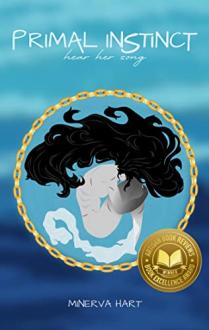
The year is 2099, and humanity is barely surviving in the climate disaster of its own making. The air is poisoned, entire lists of animal species are extinct, and the seawater is acidic. To top it off, multi-million corporations have crafted fiefdoms of what remains. From where cynical and lonely Freddie Molloy is standing, there is nothing to be hopeful for. Then, he meets a mermaid.
